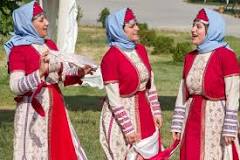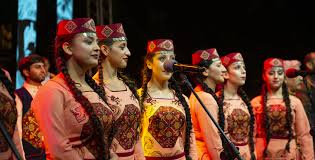Exploring Armenia’s Rich Tapestry of Culture and Time-Honoured Traditions

The Rich Culture and Time-Honoured Traditions of Armenia
Armenia, a country nestled in the Caucasus region, boasts a vibrant culture steeped in history and tradition. From its ancient roots to modern influences, Armenian culture is a tapestry of diverse customs and practices that have been passed down through generations.
Art and Craftsmanship
Armenia is renowned for its exquisite craftsmanship, particularly in the realm of traditional arts. Intricate handwoven carpets, delicate pottery, and ornate jewellery are just a few examples of the artistic treasures that reflect Armenia’s rich cultural heritage. These crafts not only serve as decorative pieces but also carry deep symbolic meanings that connect them to the country’s history and identity.
Cuisine
Armenian cuisine is a delightful fusion of flavours and ingredients that have been perfected over centuries. From hearty meat dishes like khorovats (barbecue) to delicate pastries such as gata (sweet bread), Armenian food is a celebration of local produce and culinary expertise. Sharing meals with family and friends is an integral part of Armenian culture, fostering a sense of community and togetherness.
Festivals and Celebrations
Throughout the year, Armenians come together to celebrate a myriad of festivals that honour their traditions and beliefs. Events like Vardavar, which involves water fights to commemorate the Transfiguration of Jesus Christ, or Navasard, a festival marking the Armenian New Year, showcase the vibrant spirit and joyous nature of Armenian culture.
Music and Dance
Music and dance play an integral role in Armenian culture, serving as expressions of emotion, storytelling, and community bonding. Traditional instruments like the duduk (woodwind instrument) produce haunting melodies that evoke deep emotions, while lively folk dances such as kochari embody the energy and vitality of Armenian traditions.
Religious Heritage
Armenia’s religious heritage is deeply intertwined with its cultural identity. The country was the first to adopt Christianity as its state religion in 301 AD, leading to the construction of numerous monasteries, churches, and religious sites that stand as testaments to Armenia’s enduring faith and spiritual legacy.
In conclusion, Armenia’s culture is a treasure trove of artistry, gastronomy, festivities, music, dance, and spirituality. It is a living testament to the resilience and creativity of its people who continue to preserve their traditions while embracing modern influences. To experience Armenia is to embark on a journey through time where ancient customs intertwine with contemporary expressions in a harmonious blend that defines this remarkable nation.
Understanding Armenian Culture: Etiquette, Traditions, Fascinating Facts, and Culinary Delights
- What is the etiquette for Armenian guests?
- What is Armenian culture known for?
- What are 5 interesting facts about Armenia?
- What is Armenian culture food?
What is the etiquette for Armenian guests?
When it comes to etiquette for Armenian guests, there are several important customs to keep in mind. Armenians place a strong emphasis on hospitality and respect towards visitors, considering guests as blessings. It is customary for guests to remove their shoes before entering someone’s home as a sign of respect. Additionally, bringing a small gift, such as flowers or sweets, for the host is greatly appreciated. During gatherings, it is polite to wait until the host invites you to start eating and to express gratitude for the hospitality shown. Engaging in meaningful conversations and showing genuine interest in Armenian culture and traditions further enhances the guest experience and fosters positive interactions with hosts.
What is Armenian culture known for?
Armenian culture is renowned for its rich tapestry of traditions that have been meticulously preserved and passed down through generations. From its intricate craftsmanship in arts and crafts to its delectable cuisine that tantalizes the taste buds, Armenia is a treasure trove of cultural treasures. The country’s vibrant festivals and celebrations bring communities together in joyous revelry, while its music and dance forms serve as expressions of emotion and storytelling. Armenian culture is also deeply rooted in its religious heritage, with numerous churches and monasteries standing as testaments to the country’s spiritual legacy. Overall, Armenian culture is celebrated for its diversity, authenticity, and the unwavering pride with which its people uphold their customs and beliefs.
What are 5 interesting facts about Armenia?
Armenia, a country rich in culture and traditions, holds a tapestry of intriguing aspects that captivate visitors and locals alike. Five fascinating facts about Armenia include its status as the first country to adopt Christianity as a state religion in 301 AD, the presence of Mount Ararat, a national symbol and biblical landmark, the invention of the Armenian alphabet by Mesrop Mashtots in the 5th century, the tradition of lavash, a thin unleavened flatbread recognized as intangible cultural heritage by UNESCO, and the enduring practice of khachkar carving, intricate stone crosses that blend artistry with spirituality. These unique facets contribute to Armenia’s distinctive charm and allure, making it a destination brimming with history and wonder.
What is Armenian culture food?
Armenian culture food is a delightful reflection of the country’s rich culinary heritage, characterised by a diverse array of flavours and dishes that have been perfected over generations. From succulent barbecue meats known as khorovats to aromatic pilafs and delicate pastries like gata, Armenian cuisine is a celebration of fresh ingredients, traditional recipes, and communal dining experiences. The emphasis on sharing meals with loved ones underscores the importance of food not just as sustenance but as a means of fostering connections and preserving cultural traditions. Each bite of Armenian cuisine tells a story steeped in history, creativity, and the warmth of hospitality that defines this vibrant culinary tradition.

